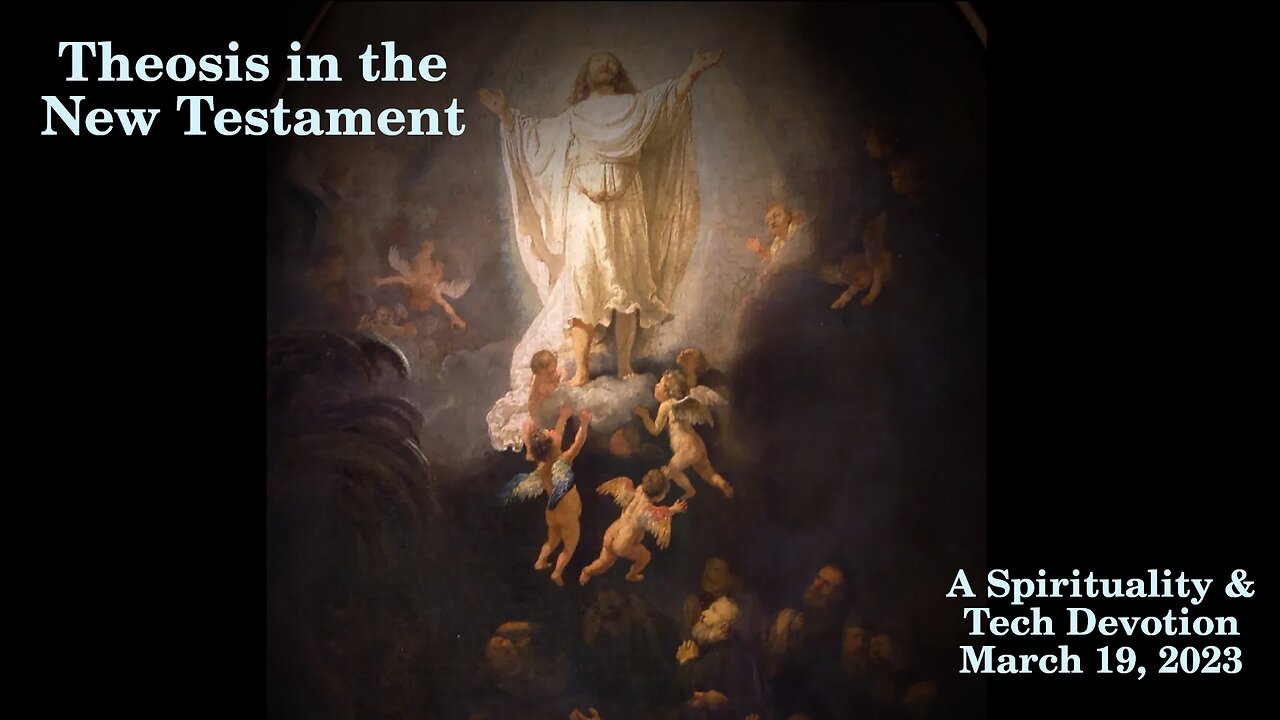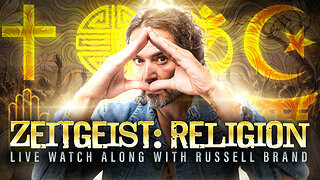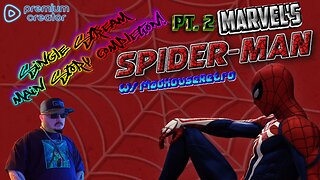Premium Only Content

Theosis 3: Theosis in the New Testament
Lord,
As we open your Word, help us to get what we need from it today. Holy Spirit, come and open our minds and hearts to hear what You are saying. If we need a recalibration, then recalibrate us today. Help us to grasp who we are in Jesus so that we can embrace the suffering that will shape us to be ready to join with You. Sanctify us in Your Truth, cleanse and rest our divine imaginations that we would be able to see that which You put in Your Word accurately today. In Jesus’ name,
Amen.
There are many passages which could lend themselves to this project, but we will work from ones that we will talk about this week in the memesplanations: Philippians 2:5-7, John 10:34, Hebrews 2:7, and Romans 8:17.
In John, we see Jesus defend himself against charges of blasphemy by quoting Psalm 82:6, which we just talked about yesterday. In that verse, God chastises the children of Israel (who were given the law), by saying that they are gods and children of God, and it was given to them to be judges in the earth, but they were failing in that task. So rather than ascending to the heavens, they would die, and die like men, then be buried.
In Romans, Paul riffs on the theme of being “children of God”, and how can we be children and heirs if we cannot partake in His nature? But wait, if God is wholly other than us, then how can we participate in his nature and in his treasures? That is why Jesus came, was made incarnate, and died on the cross, only to be raised again on the 3rd day. He became human that we would be able to be made one with God. That is what At-One-Ment is about, not simply erasing our sin. There is, however, a condition on receiving the offered gift: we must partner with Jesus in His suffering. We cannot be resurrected without first dying, and dying daily, as that old nature tries to reassert itself on the daily, doesn’t it? That old part of us that was given to the dominion of sin, though in the East, they would not use these terms, as they do not believe in original sin. For them, any sin nature we may have lived under was due to our own choices, not to some pre-existent original sin that is the domain of humanity since the Fall. I digress, though. How do we partner with Him in His suffering? We learn to love as He does. We learn to empty ourselves of pride, walking in a state of kenosis is suffering, and the world will try to beat up on us for living in such a radical way.
In Philippians, we learn about the way of kenosis from Paul, and that we are called to live in the same way, forgetting ourselves in order to love God and others more fully. That does not mean that we neglect physical needs for extended periods. If Jesus can operate as a poor, powerless human, though He is God, even to the point of dying to save us from our own pride, so that we can be one with Him, even here and now, but to finish the process when we die. This is why elsewhere, Paul tells us to “work out our salvation with fear and trembling”. I could talk about this for far longer, just diving into these passages for their own sake... What do you guys think? A study on what it is to be “in Christ” after Easter?
In the Hebrews passage, we see the writer pull directly from the Septuagint in Psalm 8. I will talk more about this passage in Saturday’s memesplanation. I find it interesting that they (whoever the author was) pulled from the Greek translation, rather than directly from the Hebrew original text. I don’t know, but this is one of the prooftexts, though the Greek used is what we get the word “angel” from , rather than the more controversial elohim or a Greek equivalent such as Theos.
What do you guys think about theosis based on these texts? Do you think it is heretical or perhaps might be something that we have missed out on here in the West? Let me know in the comments.
-
 54:40
54:40
BonginoReport
1 day agoLABOR DAY SPECIAL! The Best of Nightly Scroll - Nightly Scroll w/ Hayley Caronia (Ep.124)
77K11 -
 LIVE
LIVE
Spartan
5 hours agoNew Game+ on E33, then back to Halo Grind
101 watching -
 1:06:10
1:06:10
Russell Brand
9 hours agoThe Greatest Lie Ever Told? - SF625
61.2K94 -
 LIVE
LIVE
GrimmHollywood
6 hours ago🔴LIVE • GRIMM HOLLYWOOD • SKATE EARLY ACCESS • BRRRAP PACK • READY OR NOT •
116 watching -
 LIVE
LIVE
SavageJayGatsby
3 hours agoLet's Play: Pacific Drive || $300 Weekly Goal - Spicy Bite Saturday || Teen Drinkin is Very Bad
42 watching -
 LIVE
LIVE
blackfox87
3 hours agoWe Back Baby!! | PREMIUM CREATOR | #DisabledVeteran
289 watching -

MadHouse_
2 hours agoFinsihing up the Main story and then some DLC.
8.06K -
 1:41:06
1:41:06
vivafrei
6 hours agoTrump Changing Tune on Operation Warp Speed? CBC Promoting Propaganda? Shiloh Hendrix Update & MORE!
194K109 -
 1:44:20
1:44:20
The Mike Schwartz Show
4 hours agoTHE MIKE SCHWARTZ SHOW Evening Edition 09-01-2025
7.05K5 -
 46:25
46:25
The Quartering
8 hours agoMeta PC Winner, Trump Ruins Libs Dark Fantasy & Raja Jackson Case Heats Up!
140K62